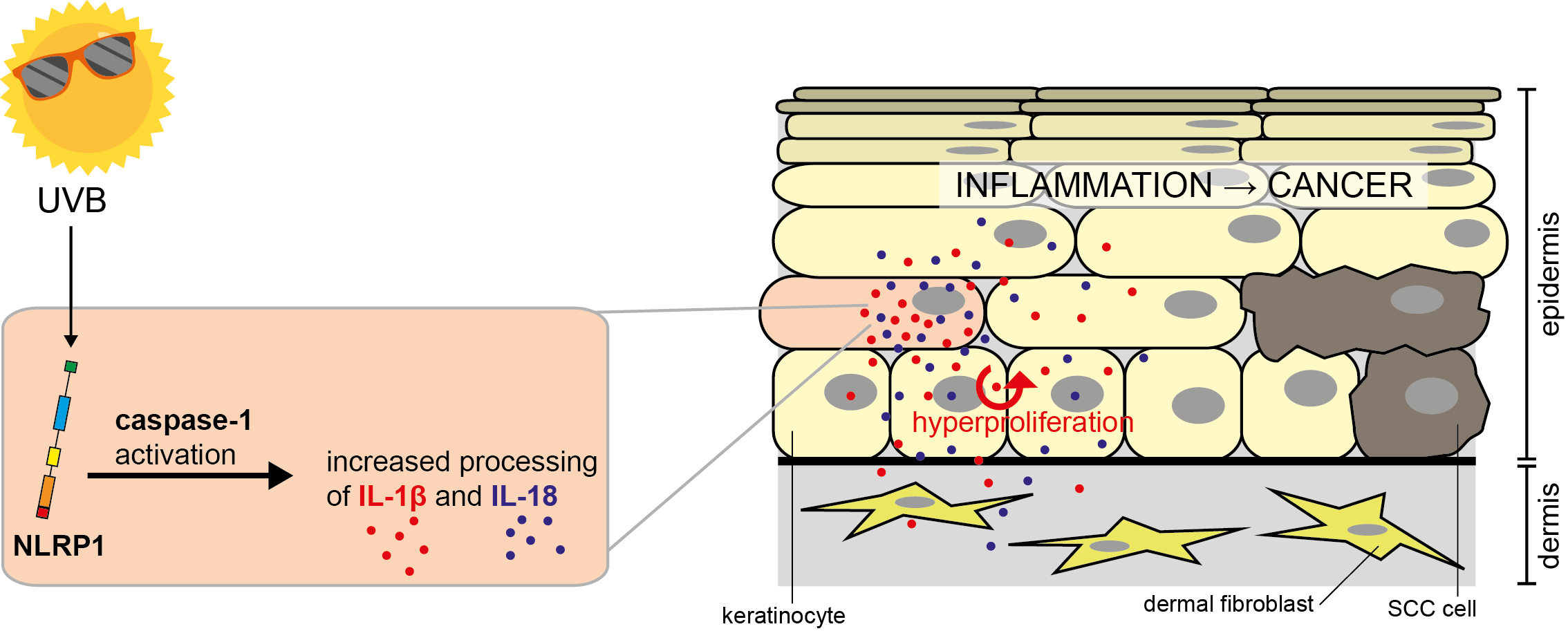What we investigate
Our research group is interested in the functions of a protein complex, termed NLRP1 inflammasome, in human epidermal keratinocytes. We are investigating the molecular mechanisms underlying UVB-induced inflammasome activation. Moreover, we are studying the relevance of the NLRP1 inflammasome for skin inflammation and cancer development.
KEYWORDS
inflammation, keratinocyte, NLRP1 inflammasome, skin cancer, UVB irradiation

Our research in more detail
Keratinocytes form the epidermis, the outermost layer of the skin, which represents the physical barrier to the environment. The epidermis protects our body from many different external stressors; for instance, UVB radiation from sun exposure is almost completely absorbed the epidermis. However, high doses of UVB are a major challenge for the skin and may induce sunburn and skin cancer development. UVB induces NLRP1 inflammasome activation in human keratinocytes and in turn activation of proinflammatory cytokines. Patients with gain-of-function mutations of NLRP1 suffer from skin inflammation and are predisposed to skin cancer, demonstrating important functions of NLRP1 in cutaneous inflammation and cancer development. However, the roles of the NLRP1 inflammasome in skin cancer development seem to be complex, since its expression is silenced in skin tumor cells. Our research aims to elucidate the molecular mechanisms regulating NLRP1 inflammasome activation and its functions in skin inflammation and cancer development. As NLRP1 is not expressed by keratinocytes in mice, we focus our research on human keratinocytes, a three-dimensional model of human skin and skin biopsies from patients.
Selected publications
SKINTEGRITY.CH Principal Investigators are in bold:
- Fenini G, Karakaya T, Hennig P, Di Filippo M, Slaufova M, and Beer HD (2022). NLRP1 inflammasome activation in keratinocytes: increasing evidence of important roles in inflammatory skin diseases and immunity. J Invest Dermatol, 142(9), 2313.
- Hennig P, Di Filippo M, Bilfeld G, Mellett M, and Beer HD (2022). High p62 expression suppresses the NLRP1 inflammasome and increases stress resistance in cutaneous SCC cells. Cell Death Dis, 13(12), 1077.
- Sand J, Fenini G, Grossi S, Hennig P, Di Filippo M, Levesque M, Werner S, French LE, and Beer HD (2019). The NLRP1 inflammasome is silenced in cutaneous squamous cell carcinomas. J Invest Dermatol, 139(8), 1788.
- Grossi S, Fenini G, Hennig P, Di Filippo M, Kockmann T, and Beer HD (2020). The cytoprotective major vault protein (MVP) is a substrate of caspase-1 and -9. J Invest Dermatol, 140(7), 1335.
- Fenini G, Karakaya T, Di Filippo M, Hennig P, and Beer HD (2020). The NLRP1 inflammasome in human skin and beyond. Int J Mol Sci, 21(13), 4788.
